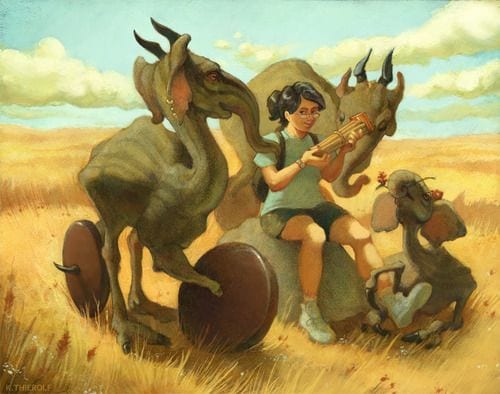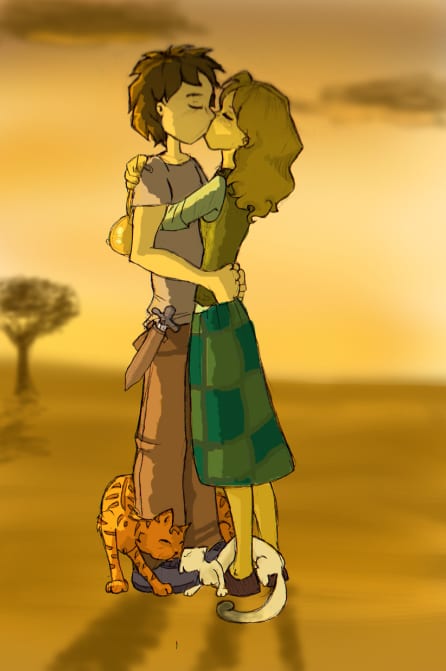“I’ll be looking for you, Will, every moment, every single moment. And when we do find each other again, we’ll cling together so tight that nothing and no one’ll ever tear us apart. Every atom of me and every atom of you.. .We’ll live in birds and flowers and dragonflies and pine trees and in clouds and in those little specks of light you see floating in sunbeams… And when they use our atoms to make new lives, they won’t just be able to take one, they’ll have to take two, one of you and one of me, we’ll be joined so tight…”
An end is just a new beginning. That may officially be a cliche, but it describes how the natural world proceeds. Individuals may have a birth and a death, but even then, our experience becomes part of history, and our atoms return to the universe.
This cycle, and the emphasis on the naturalness of continuity, is the heart of the last volume of the His Dark Materials series.
A Tale of Three Protagonists
A lot happens in The Amber Spyglass. More than the two previous volumes put together, it feels like. Lyra’s journey to the north to be there when her father opened the rift between worlds, and Will’s mastering the Subtle Knife as he went looking for his own was just the prologue. The story we end up with is one with three protagonists; Lyra, Will, and Mary.
Pullman’s volumes are structured so that each adds a new member to his trinity. The first focused entirely on Lyra and took place in her world, where humans come in two parts; the body that we would recognize, and a daemon an animal-shaped being that is the spirit. (There’s also the soul, that is distinct from both body and daemon, so this trinity thing is not incidental.) In the second volume, Will, a troubled young boy from our own world with a knack for the public manipulation of image, becomes a co-protagonist and the two form a bond that continues her, and across the multiverse.
In The Subtle Knife, we were also introduced to Mary Malone, a practicing scientist and ex-nun, who somehow gets sucked into all of this magical destiny stuff because she’s studying dark matter, but dark matter is also Dust, and Dust is conscious. (It mostly makes sense, honest.) So she finds herself as aprotagonist too, and travelling to a different universe to study dark matter in an entirely novel way.
It would be easy to get lost in the weeds of recapping the plot, but you could easily read a Wikipedia article for that. The things that interests me far more are them themes and that way the characters bring them forward.
The one thing that stood out most to me after not having read this series in such a long time, and given its reputation as “the one with the god-killing,” is that almost every action by a central character reaffirms the essential goodness and peacefulness of humanity. Again and again, the protagonists walk into situations that feel as though they should end in violence, but they don’t, because our heroes instinctively trust in the good intentions of everyone. When Will runs into the bears and the inhabitants of a village attacking each other, he tricks them all into making a truce. When Lyra encounters a group of people spend their whole lives being followed around by a shadowy personification of their own death, she reacts with empathy and uses her experience of daemons and those worlds without them to build bridges. When Mary encounters the mulefa, beings in another universe that are as different from us as beings can be, what feels like a set-up for a violent encounter becomes a touching moment as they recognize their shared “humanity.” When the kids go down into hell/purgatory, they encounter harpies, beings whose job is to torment the souls of the dead for all eternity, and they makes friends with them. Yes, with the guys whose job it is to make hell hellish.
These people, in other words, are full of love and good faith that their magical destinies are almost a foregone conclusion, because they always try to do the right thing. Lyra and Will save the souls of the dead, not because they wanted to destroy the concept of death, but because Lyra’s friend was suffering and they wanted to save him. Mary didn’t intend to “tempt” them into reenacting the Fall and restarting the symbiotic cycle of humans and Dust; all she did was make friends with elephant people, do some science, and tell her story.

The exception to this pattern of good faith is found in the characters who are, ironically but also not at all, associated with Faith. This is not at all surprising, given Pullman’s biases (and stated aims), but even so, the contrast is explicit. This the most clear when you contrast Mary’s encounter with the mulefa and Father Gomez’s encounter with the tualapi. (They’re bird things.)
She stepped out of the shelter of the roots and faced them directly. She held out her hands, realizing that such a gesture might mean nothing to creatures with no hands themselves. Still, it was all she could do. Picking up her rucksack, she walked across the grass and stepped onto the road. Close up, not five steps away, she could see much more about their appearance, but her attention was held by something lively and aware in their gaze, by an intelligence. These creatures were as different from the grazing animals nearby as a human was from a cow.
Mary pointed to herself and said, “Mary.”
***
The bird’s head exploded in a mist of red and white, and the creature blundered on clumsily for several steps before sinking onto its breast. [….] The other birds had stopped as soon as the first one fell, and stood watching it, and watching the man [Father Gomez], too. There was a quick, ferocious intelligence in their eyes. They looked from him to the dead bird, from that to the rifle, from the rifle to his face.
He raised the rifle to his shoulder again and saw them react, shifting backward clumsily, crowding together. They understood.
God is Dead, Long Live Dust
The series is supposed to be about killing god. But not really.
The Authority doesn’t die, he just kind of fades away, having been largely irrelevant for a very, very long time. Lyra and Will don’t slay him, they pity him.
Will saw her hands pressing against the crystal, trying to reach in to the angel and comfort him; because he was so old, and he was terrified, crying like a baby and cowering away into the lowest corner.
“He must be so old, I’ve never seen anyone suffering like that, oh, Will, can’t we let him out?”
This may seem like an anticlimax, but I would argue that it’s very much the point. The Authority never really mattered, his power was never real. The only power he ever had was in the control that humans across the various universes allowed him to have. After his death, and even the death of Metatron (his real name), the Church didn’t magically disappear, because its need to control is not actually reflective of any experience of the divine. The only real danger in god was what his followers were willing to do to have power.
Subtle, Mr. Pullman.

The closest thing the universe of His Dark Materials had to divinity is Dust itself. And Dust is the most humanistic kind of divinity you can imagine, because Dust is the experience of being human. It’s the matter that our souls are made of, that gives us the ability to reason and feel emotion, and it is in turn generated by those capacity.
It’s fun to think of how the chicken-and-the-egg scenario must work here. Dust occurred naturally and the Authority emerged from it, or it came from him? He was the first to feel and reason, so did it begin with him, or is the way we think we feel the physical consequence of the nature of Dust, and the Authority was just coincidentally the first being-shaped blob that had those properties?
Like I said, it’s fun. But what really matters about Dust is the fact that it connects us, as humans, to the universe in a way that is quintessentially empowering. It makes the experience of being human the most precious and most powerful thing in the universe. This is brought best into focus by the ordinariness of the great multiverse moving acts of the protagonists, longing for your friend, falling in love, having your heart broken.
The greatest thing a person can do is to simply live a good life.
This is not even close to all my thoughts on this series. As well as a look at the visual adaptation of fist book The Golden Compass, I also plan to discuss the character of Mrs. Coulter more closely at some point, and perhaps, if I feel brave, I’ll delve into Will and Lyra in the context of the development of sexuality in children’s literature.
Watch this space.

